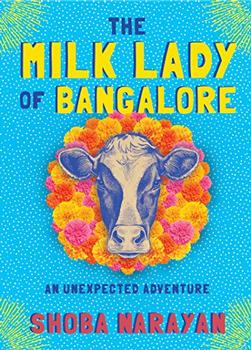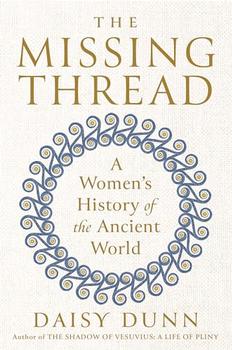Write your own review!
Kathy (ME)
Udderly Charming
The Milk Lady of Bangalore is a charming and eccentric blend of memoir and non-fiction told through a bovine lens. While providing a unique and quick peek into India's cultures, religions, history, caste system and languages, it is also a simple tale of a friendship that crosses many of these apparent barriers. Narayan never preaches and manages to avoid dry informational passages; her writing is consistently approachable and often humorous. While cows are the thread tying the whole story together, readers don't need to have a fascination with these creatures to enjoy Narayan's book. I've never read Narayan's previous work, but I loved her perspective as an alternating U.S./Indian citizen and look forward to reading more.
Susan U. (Milwaukee, WI)
Pleasant surprise
This book had much more depth than I expected, it's a memoir, not a fluff book. I could taste and smell the milk, see the people, see the cows faces and look into their eyes. The author's descriptions were so vivid. Who would have thought there were so many kinds of cows, that their milk tastes different based on what they eat, where they live, how they are treated. And I definitely have a new respect for those that tend and milk the cows. The cows are members of their family - life in India made real. Thank you.
Courtney N. (Chicago, IL)
Cow Culture
I found this book very interesting in its coverage of why cows are so important in Indian culture and how that manifests itself in daily life. The author as an Indian woman who also had lived in the USA had a unique perspective of both understanding the importance of the cow and also understanding why those outside of the culture don't get it.
Patricia T. (Fallbrook, CA)
The Milk Lady of Bangalore
If you are looking for an informal tutorial on the Hindu religion, in particular the significance of the cow in every day life, this is for you. Written by an ex-pat returning to India with her family after 20 successful years in the west, it is endearing, and very funny in a dry way. It revolves around her relationship with the local milk lady, and how she deals with the frustrations and contrasts of modern India. We don't really learn how the milk lady feels, just how she lives and reacts to her new friend. A great read for young readers, it will give them a look at another culture in a gentle but genuine way.
Janice P. (South Woodstock, VT)
A Disappointment
The author is a naturalized US citizen who returns with her husband and family from their privileged lifestyle in midtown Manhattan to her native India, to introduce the children to their heritage. She befriends Sarala, a local vendor who sells fresh raw milk from her own cows,raised right in the heart of the city, for Indian housewives to make their weekly supply of yogurt and paneer.
"Befriends" is the word used on the book's cover, but the author chooses to clarify the two women are not friends, which raises a question for this reader! Their relationship over the years (it's not clear how many), seemingly the focus of the book, serves primarily as a device for weaving together many interesting details about cows in general and their importance in the culture of modern India (and not only for Hindus) which goes far beyond supplying milk. Narayan relates her adventures in learning about cows, with Sarala's help,in a light-hearted tone that has probably more to do with the author's privilege in both nations than with the daily reality for most Indians.
More than once she acknowledges her privilege, claiming to "fret a lot" about a lifestyle with twice as many servants as family members, and guilt that drives her to hide her ample supply of fine saris from her house cleaner ; she goes for therapy and is glad to be told to relax and accept it, just drink warm milk.There seems to be a disconnect between her journalistic honesty and her readiness to make light of the situation and focus on the joy of owning a cow, for her spiritual benefit, that someone else takes care of. Unwittingly, this book reveals more about the author than about her subject or her setting -- which disappointed me, as my interest in India is what led me to read it.
Lois P. (Hillsborough, NC)
Everything you wanted to know about cows in India
This non-fiction books takes you to India and another world. The author learns all about why people in India value fresh cow's milk and may be picky about the color of the cow that the milk came from. She begins the book with a cow being paraded into an apartment as a blessing.
If cultural traditions involving livestock fascinate you, then this book is for you.
Eileen C. (New York, NY)
Milk, cows, and cow patties
In the beginning, I thought this book was about how the author adjusted returning to India with its rather unusual customs after spending close to 20 years in New York City. Then I thought perhaps it is about a kind of friendship that developed between a wealthy woman and a woman who lives in the slums and sells milk for a living. Then I thought maybe it was more about the role cows play in Indian culture. Although The Milk Lady of Bangalore is clearly written and very entertaining in parts, Narayan doesn't ever seem to decide what she is writing about which, for me, meant that the book never fully captured my imagination as I didn't come to any type of better understanding of the people or the place that she was writing about.
Poornima A. (Walpole, MA)
Average at best
I couldn't figure out what this book is about: is it about the author's relationship with Sarala, the cow lady, about the author's move back to India from the United States, about the new India? Probably a mix of all, the book is light and airy at times and veers off into deep explanations about Hinduism and the role of the cow at others. All of it topped with Narayan's incredulous tone at the situations in which she finds herself gives the narrative too much distance to really let the reader dive in. An occasionally lively read but too often it reads like the author has milked much too slender a story for an entire book.




